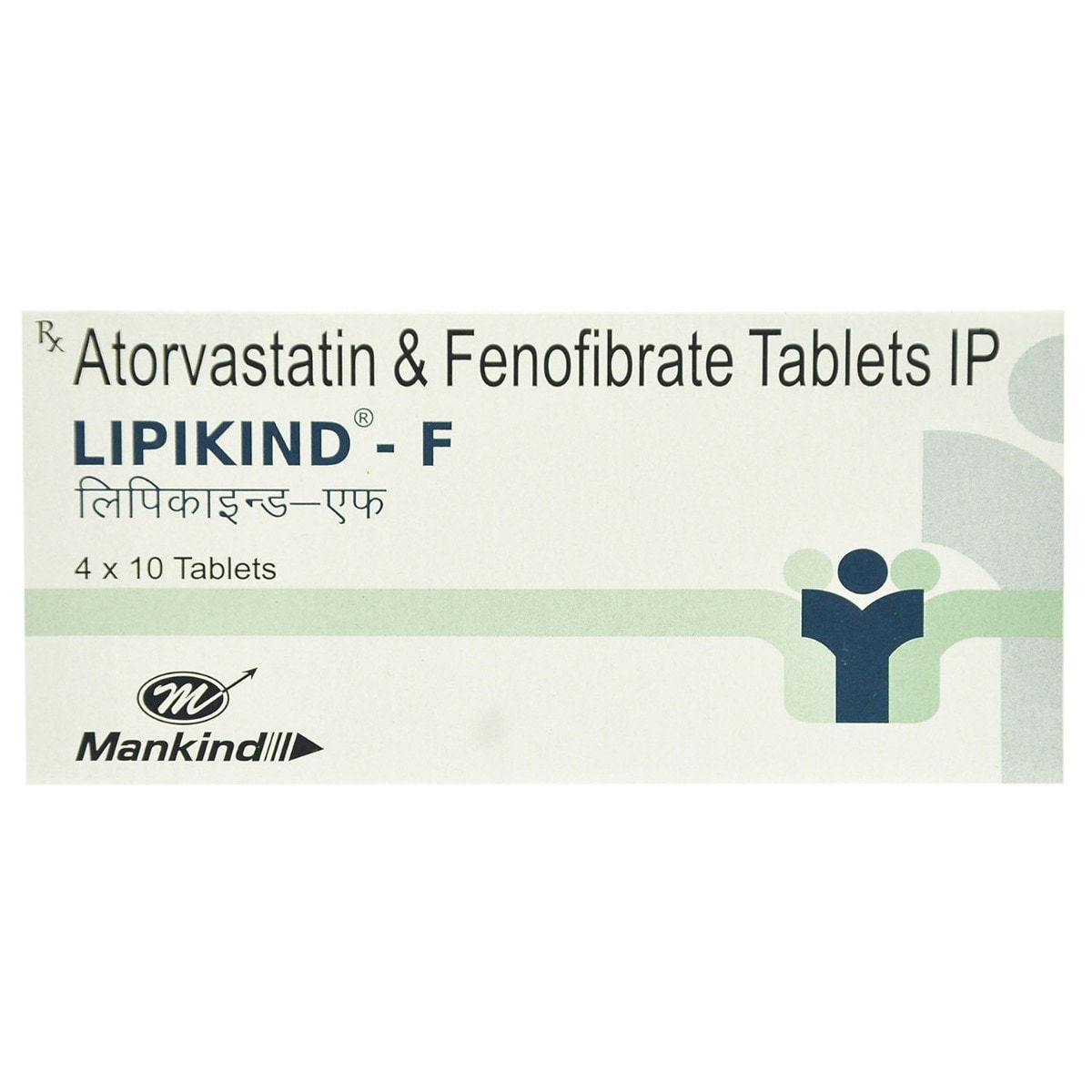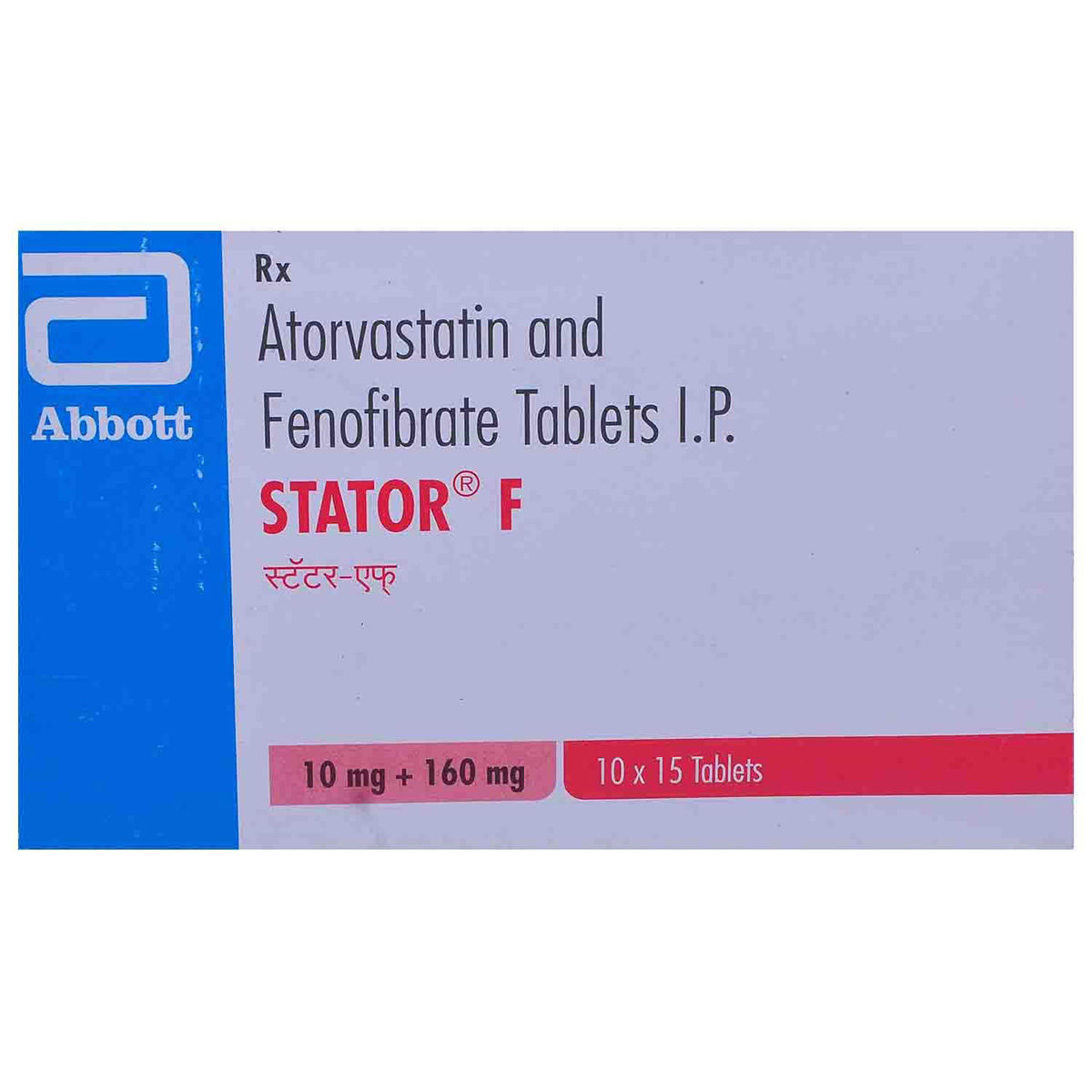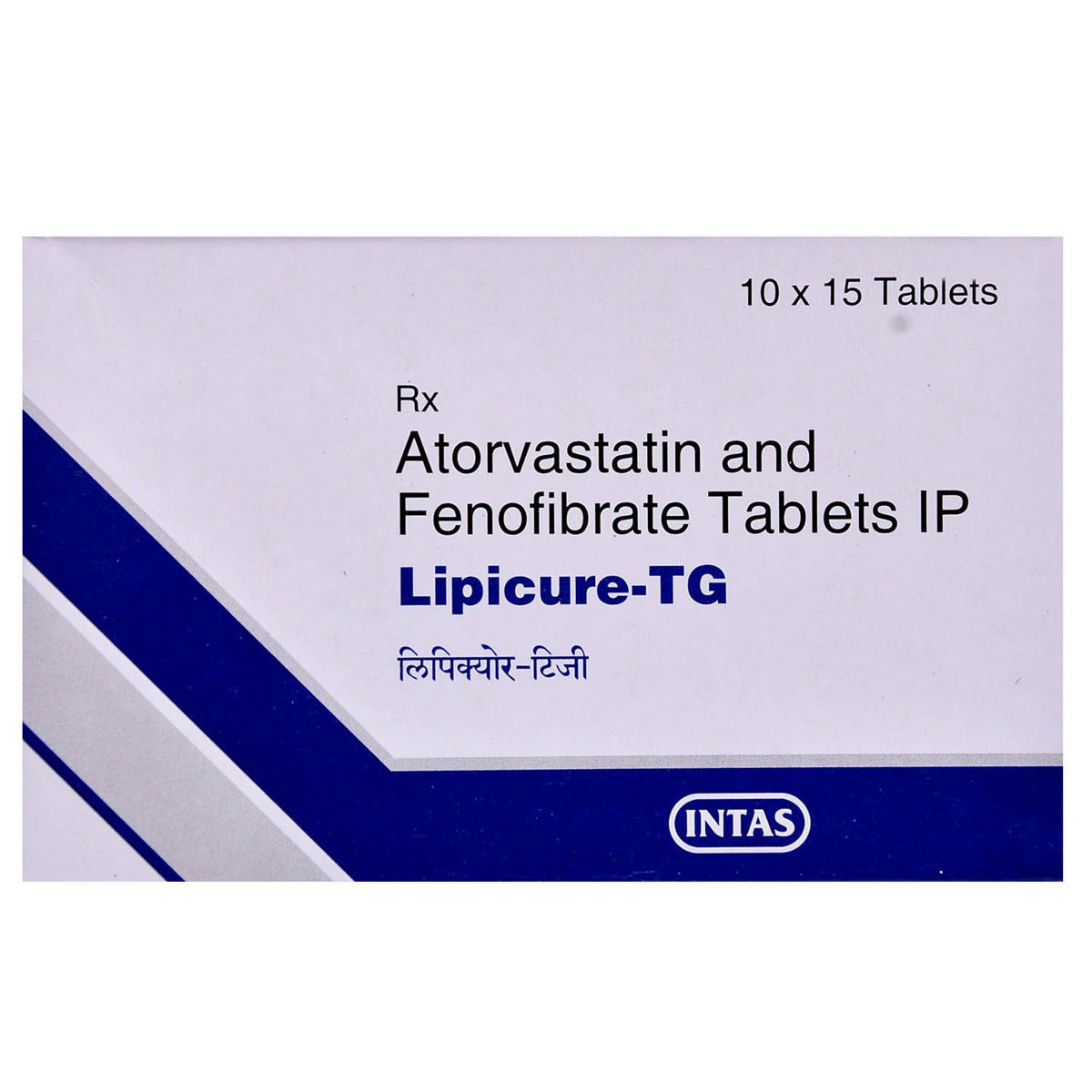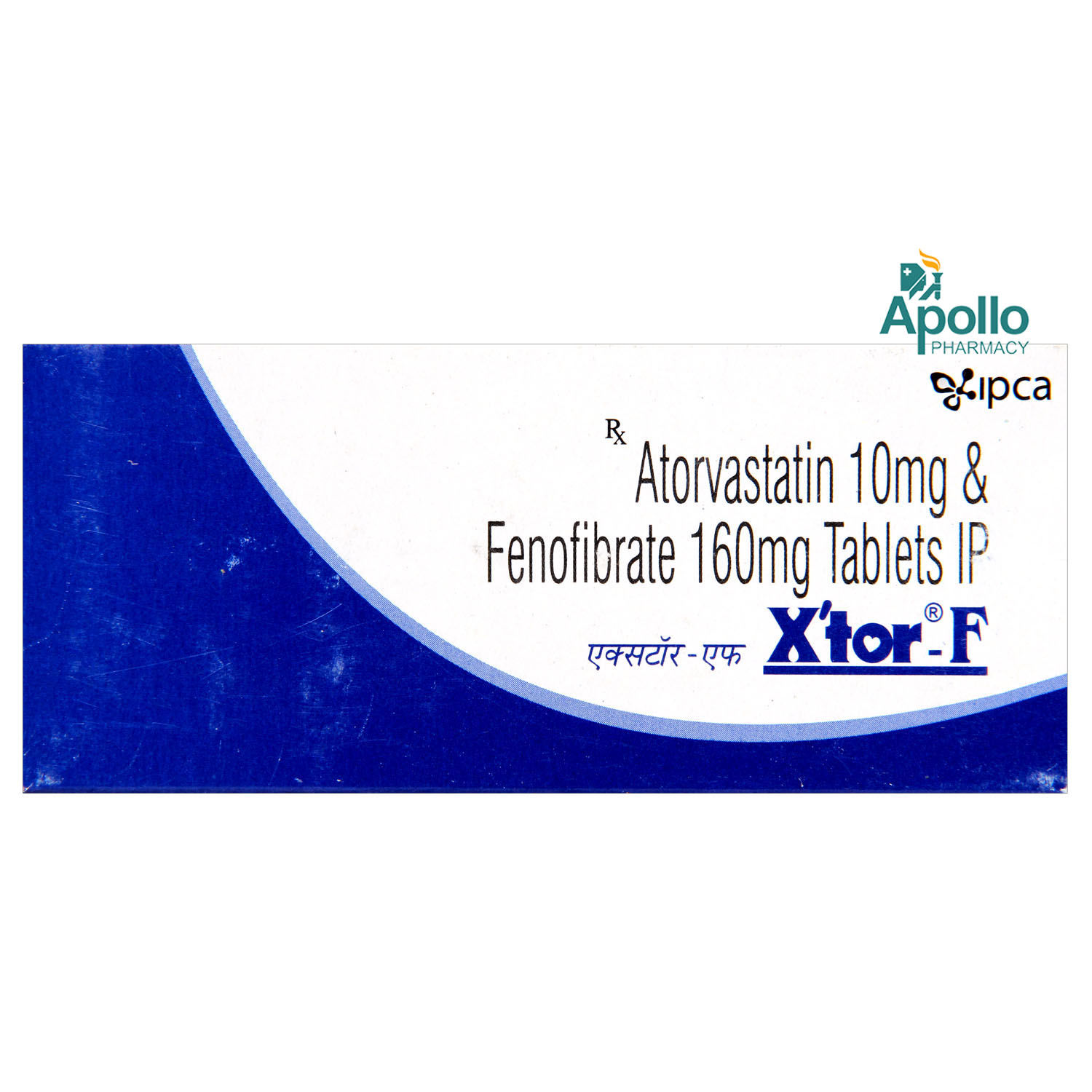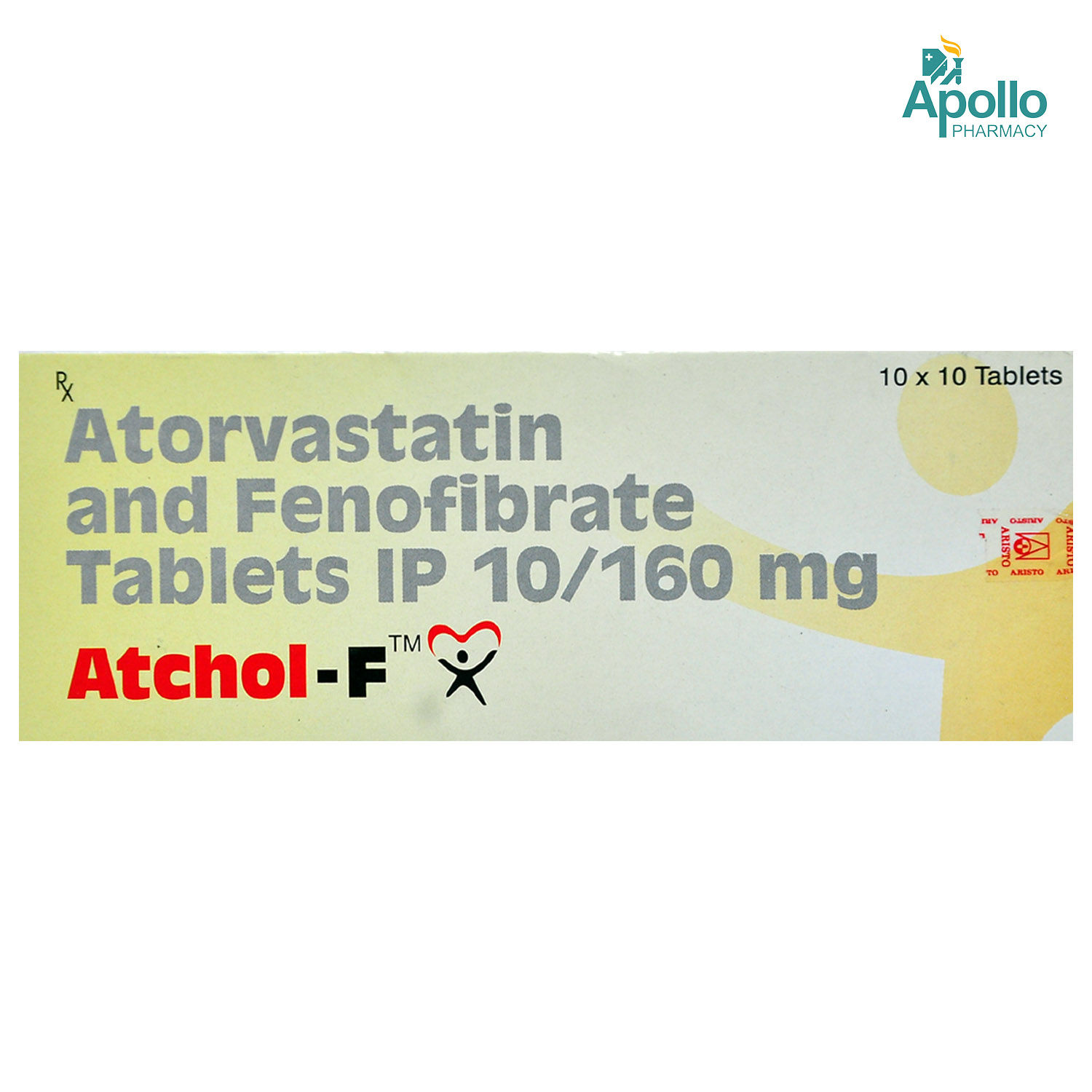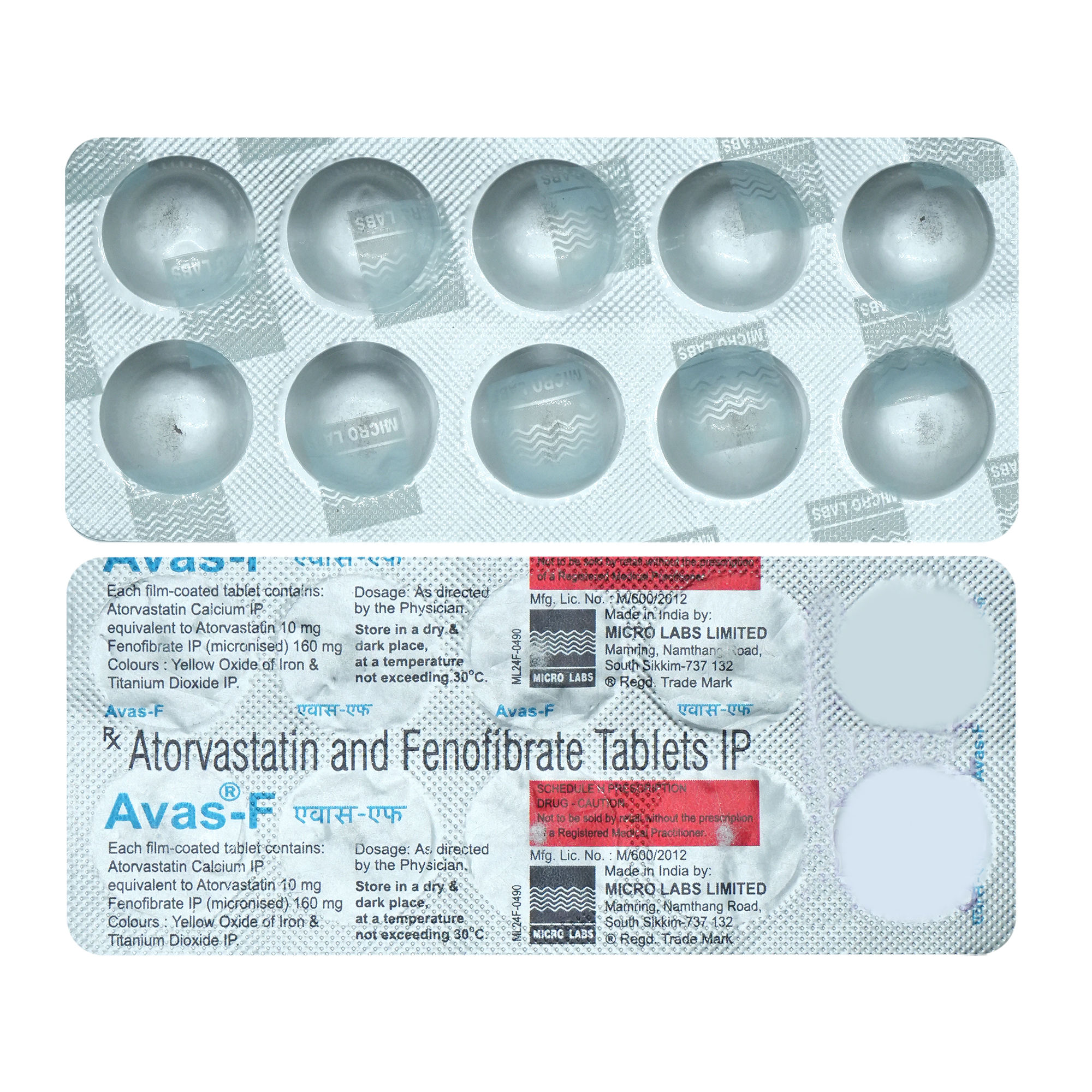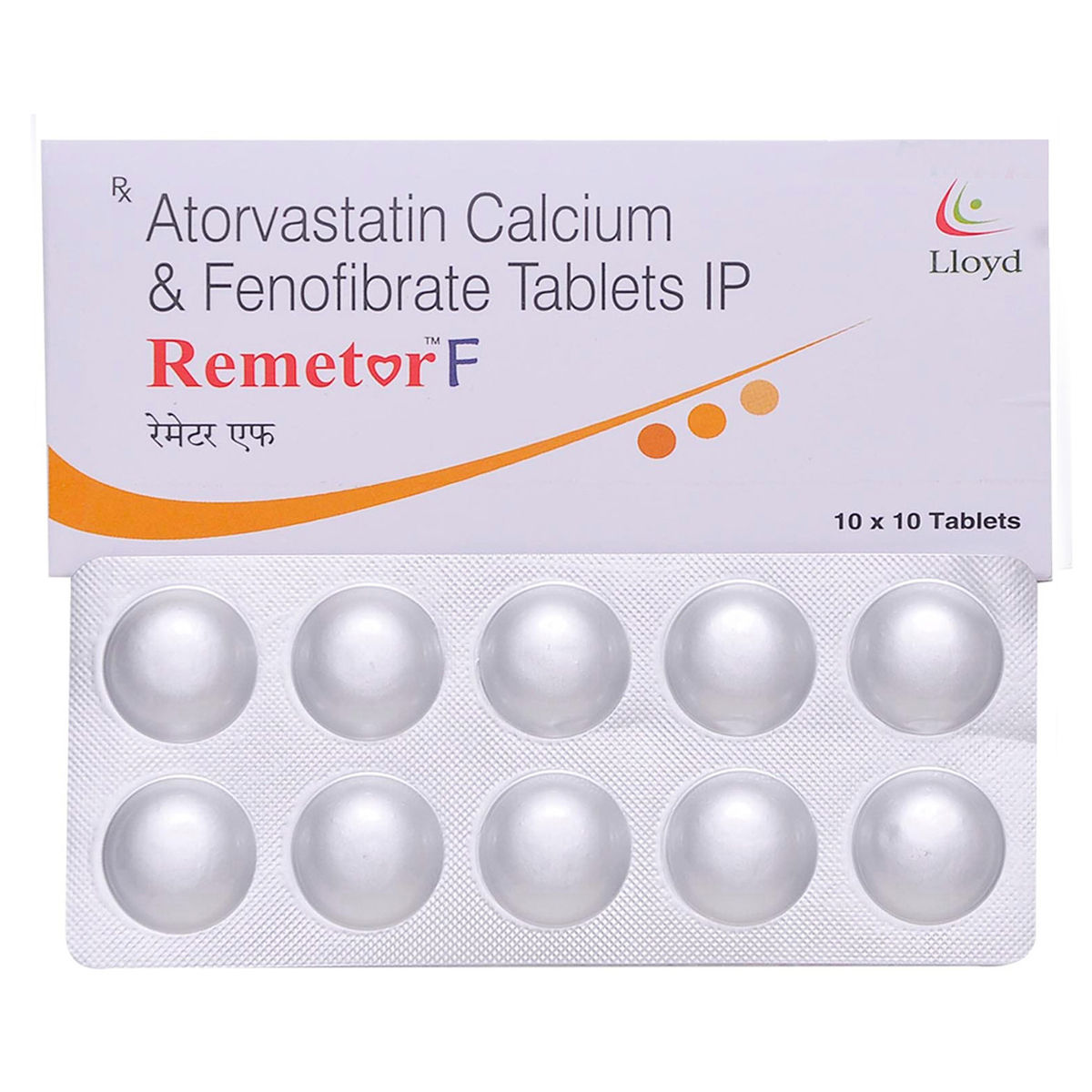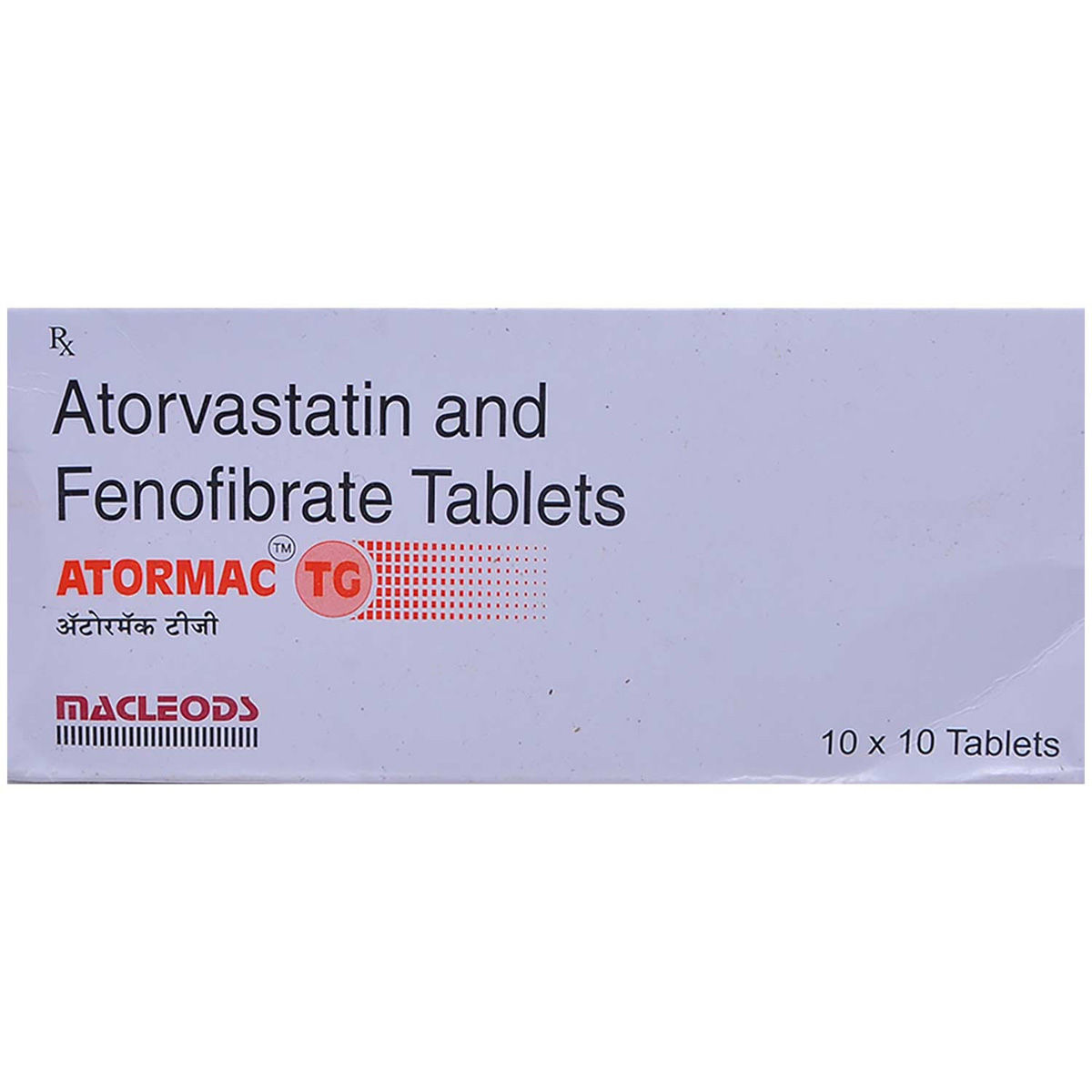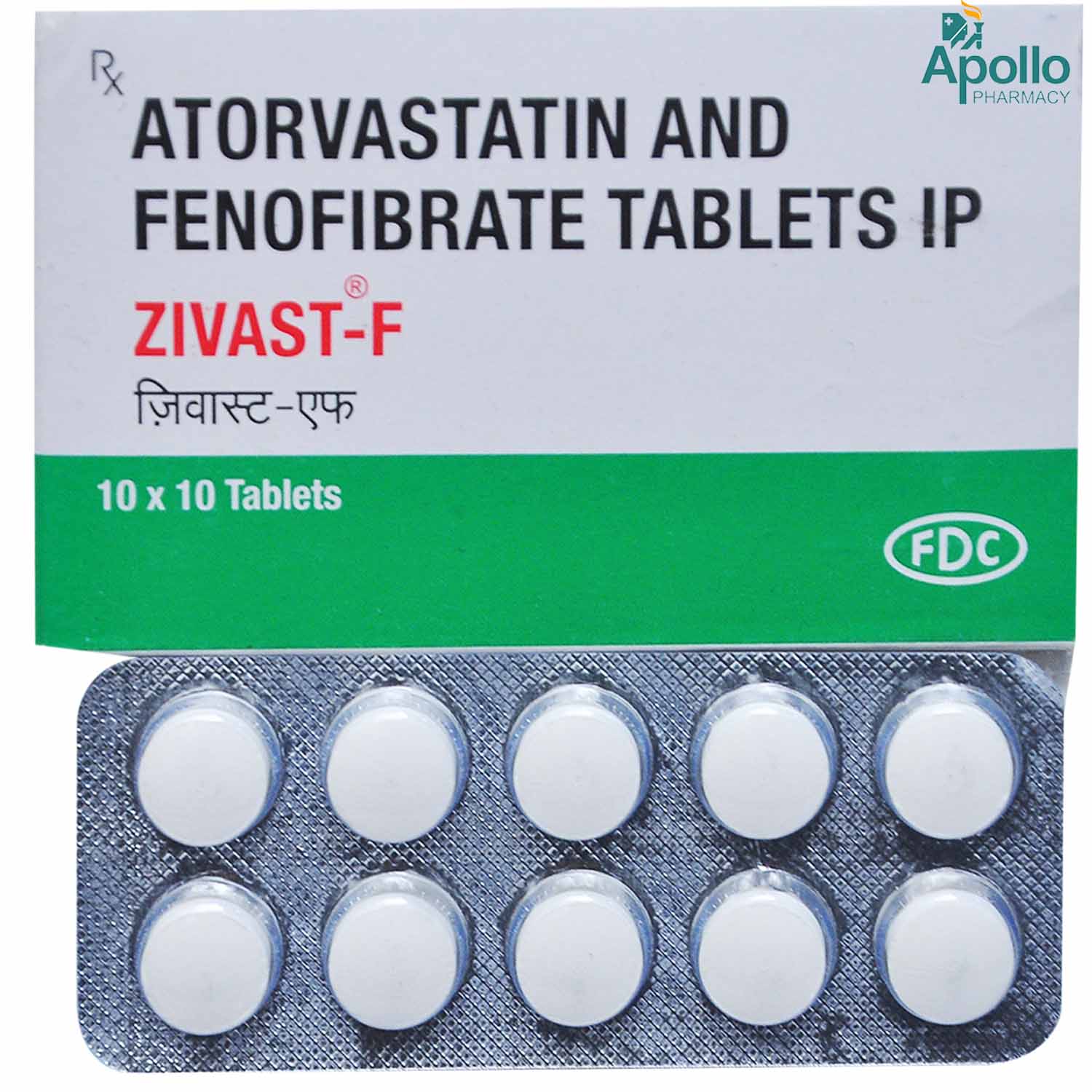Lifid F Tab 10'S
Lifid F Tab is used in the treatment of high lipid levels (cholesterol and triglycerides levels) and prevention of heart diseases and blood vessel blockage. It contains Atorvastatin and Fenofibrate, which lowers the bad cholesterol (low-density lipoproteins or LDL) and triglycerides (TG) and increases the levels of good cholesterol (high-density lipoproteins or HDL). In some cases, you may experience allergic reactions, hyperglycemia (excess of glucose in the bloodstream), headache, blurred vision, stomach pain, constipation, headaches, joint swelling (oedema), joint pain, muscle pain, back pain, slow heart rate, and nausea. Before taking this medicine, you should tell your doctor if you are allergic to any of its components or if you are pregnant/breastfeeding, and about all the medications you are taking and pre-existing medical conditions.
₹104*
MRP ₹115.5
10% off
₹98.17*
MRP ₹115.5
15% CB
₹17.33 cashback(15%)
Free Delivery
With Circle membership
(Inclusive of all Taxes)
This offer price is valid on orders above ₹800. Apply coupon PHARMA10/PHARMA18 (excluding restricted items)
Know Your Delivery Time
Provide Delivery Location

Available Offers
 Prescription drug
Prescription drugWhats That

Secure Payment

India's Most Trusted Pharmacy

Genuine Products
Composition :
Manufacturer/Marketer :
Consume Type :
Return Policy :
Expires on or after :
About Lifid F Tab
Lifid F Tab belongs to the class of medicines called antilipemic (lipid-lowering medicines) primarily used in the treatment of high lipid levels (cholesterol and triglycerides levels) and prevention of heart diseases and blood vessel blockage. Hyperlipidemia or hypertriglyceridemia is a condition in which there is a high level of low-density lipoproteins (LDL) or bad cholesterol and a decreased level of high-density lipoprotein (HDL) or good cholesterol. Increased level of bad cholesterol leads to a high risk of heart attack and stroke in the future, especially in patients with heart disease.
Lifid F Tab is composed of two medicines, namely: Atorvastatin (HMG-CoA reductase inhibitor) and Fenofibrate (fibrates). Atorvastatin is a lipid-lowering medication that blocks the enzyme HMG-CoA reductase required to make cholesterol in the body. As a result, it lowers the bad cholesterol (low-density lipoproteins or LDL) and triglycerides (TG) and increases the levels of good cholesterol (high-density lipoproteins or HDL). Fenofibrate is another lipid-lowering agent that works by increasing the natural substance (lipoprotein lipase) that breaks down fats in the bloodstream, thereby increasing its utilization and removal. As a result, it decreases harmful cholesterol like LDL (bad cholesterol) and triglycerides (TG) and increases levels of HDL (good cholesterol).
Take Lifid F Tab as prescribed. Your doctor will advise you on how often you take Lifid F Tab based on your medical condition. In some cases, you may experience allergic reactions, hyperglycemia (excess of glucose in the bloodstream), headache, blurred vision, stomach pain, constipation, headaches, joint swelling (oedema), joint pain, muscle pain, back pain, slow heart rate, and nausea. Most of these side effects of Lifid F Tab do not require medical attention and gradually resolve over time. However, if the side effects are persistent, reach out to your doctor.
Inform the doctor if you are allergic to any of the components in Lifid F Tab . If you are pregnant or breastfeeding, have hypothyroidism, drink more than 2 servings of alcohol per day, and have a muscle disorder (fibromyalgia), it is advised to inform your doctor before using Lifid F Tab . Lifid F Tab is not recommended for children below 12 years of age, as the safety and effectiveness were not established. Immediately contact your doctor if you experience yellowing of the skin (Jaundice), allergic reaction, cramps, or muscle weakness.
Uses of Lifid F Tab
Directions for Use
Medicinal Benefits
Lifid F Tab taken with dietary measures helps treat high cholesterol and prevent life-threatening conditions to the heart, especially for heart patients when initial dietary measures fail to lower cholesterol. It helps lower bad cholesterol (LDL) and increases the level of good cholesterol (HDL) in dyslipidemia or hyperlipidemia. Lifid F Tab also lowers the amount of fat or cholesterol deposition (plaque) in the arteries of the heart, thereby reducing the chance of having a heart attack or stroke in the future.
How Lifid F Tab Works
Storage
Side Effects of Lifid F Tab
- Muscle pain
- Muscle weakness
- Joint pain
- Back pain
- Stuffy/runny nose or nose bleeds
- Headache
- Blurred vision
- Increased liver enzymes
- Allergic reactions
- Hyperglycaemia (excess of glucose in the bloodstream)
- Constipation
- Nausea
- Diarrhea
What if I have taken an overdose of Lifid F Tab
Drug Warnings
A patient should consult a doctor before taking Lifid F Tab if a patient has had a previous stroke with bleeding into the brain or have small pockets of fluid in the brain from previous strokes, or has kidney problems. has under-active thyroid gland (hypothyroidism), has repeated or unexplained muscle aches or pains, has a personal history or family history of muscle problems, has previous muscular problems during treatment with other lipid-lowering medicines (e.g. other ‘-statin’ or ‘-fibrate’ medicines), drinks a large amount of alcohol, has a history of liver disease, is older than 70 years, has diabetes, especially Type 2 diabetes, that is not well controlled or has problems with certain proteins in your blood.
Drug-Drug Interactions
Drug-Drug Interactions
Login/Sign Up
Taking Lifid F Tab 10'S with Posaconazole can increase the blood levels of Lifid F Tab 10'S. This can increase the risk of side effects.
How to manage the interaction:
Although there is an interaction between posaconazole with Lifid F Tab 10'S, they can be taken together if advised by your doctor. However, contact the doctor if you experience unexplained muscle pain, weakness, fever, chills, joint pain or swelling, unusual bleeding, skin rash, itching, loss of appetite, fatigue, nausea, vomiting, dark coloured urine, or yellowing of the skin or eyes. Do not discontinue any medications without consulting a doctor.
Using Lifid F Tab 10'S together with amprenavir may significantly increase the blood levels of Lifid F Tab 10'S.
How to manage the interaction:
Although taking Lifid F Tab 10'S and Amprenavir together can cause an interaction, it can be taken if a doctor has suggested it. It's important to keep an eye on your health and talk to a doctor about any concerns. If you notice any of these signs - muscle pain, dark urine, fever, or fatigue - make sure to contact a doctor right away. They can help figure out what's going on and how to help you feel better. Do not stop using any medications without talking to a doctor.
Combining Lifid F Tab 10'S with darunavir may profoundly enhance Lifid F Tab 10'S levels in the blood. This can raise the chance of side effects (liver injury and rhabdomyolysis, an uncommon but serious illness that causes the breakdown of skeletal muscle tissue. Rhabdomyolysis occasionally results in kidney injury).
How to manage the interaction:
Taking Lifid F Tab 10'S with darunavir can result in an interaction, it can be taken if a doctor has advised it. However, if you experience muscle pain, tenderness, or weakness, accompanied by fever or dark colored urine, chills, joint pain or swelling, unusual bleeding or bruising, skin rash, itching, loss of appetite, fatigue, nausea, vomiting, dark colored urine, light colored stools, and/or yellowing of the skin or eyes, you should consult the doctor. Do not stop using any medications without talking to a doctor.
Using Lifid F Tab 10'S together with simeprevir may significantly increase the blood levels of Lifid F Tab 10'S.
How to manage the interaction:
Although taking Lifid F Tab 10'S and Simeprevir together can cause an interaction, it can be taken if a doctor has suggested it. You should seek immediate medical attention if you develop fever, chills, joint pain or swelling, unusual bleeding or bruising, skin rash, itching, loss of appetite, fatigue, nausea, vomiting, dark colored urine, and/or yellowing of the skin or eyes. Do not stop using any medications without a doctor's advice.
Using Lifid F Tab 10'S together with nefazodone may significantly increase the blood levels of Lifid F Tab 10'S.
How to manage the interaction:
Taking Lifid F Tab 10'S with Nefazodone together can result in an interaction, but it can be taken if a doctor has advised it. You should seek immediate medical attention if you develop fever, chills, joint pain or swelling, unusual bleeding or bruising, skin rash, itching, loss of appetite, fatigue, nausea, vomiting, dark colored urine, and/or yellowing of the skin or eyes. Do not stop using any medications without a doctor's advice.
Coadministration of Erlotinib with Lifid F Tab 10'S can raise the chance of side effects (liver injury and rhabdomyolysis, an uncommon but serious illness that causes the breakdown of skeletal muscle tissue. Rhabdomyolysis occasionally results in kidney injury).
How to manage the interaction:
Taking Erlotinib with Lifid F Tab 10'S together can result in an interaction, it can be taken if a doctor has advised it. However, if you notice any unexplained muscle pain, muscle stiffness or tenderness, fever, dark-colored urine, or weakness, you should contact a doctor immediately. Do not stop using any medications without talking to a doctor.
Using Lifid F Tab 10'S together with danazol may significantly increase the blood levels of Lifid F Tab 10'S.
How to manage the interaction:
Concomitant administration of Lifid F Tab 10'S along with danazol can result in an interaction, it can be taken if a doctor has advised it. However, if you experience muscle pain, tenderness, or weakness, accompanied by fever or dark colored urine, chills, joint pain or swelling, unusual bleeding or bruising, skin rash, itching, loss of appetite, fatigue, nausea, vomiting, dark colored urine, light colored stools, and/or yellowing of the skin or eyes, you should consult the doctor. Do not stop taking any medication without doctor's advice.
Combining Lifid F Tab 10'S with atazanavir may drastically elevate Lifid F Tab 10'S levels in the blood. This can raise the chance of side effects (liver damage and rhabdomyolysis - an uncommon but serious illness that causes the breakdown of skeletal muscle tissue. Rhabdomyolysis occasionally results in kidney injury).
How to manage the interaction:
Taking Lifid F Tab 10'S with atazanavir can result in an interaction, it can be taken if a doctor has advised it. However, if you experience muscle pain, tenderness, or weakness, accompanied by fever or dark colored urine, chills, joint pain or swelling, unusual bleeding or bruising, skin rash, itching, loss of appetite, fatigue, nausea, vomiting, dark colored urine, light colored stools, and/or yellowing of the skin or eyes, you should consult the doctor. Do not stop using any medications without talking to a doctor.
When Gemfibrozil is taken with Lifid F Tab 10'S, the chance of side effects such as liver damage and rhabdomyolysis, (an uncommon illness involving the breakdown of skeletal muscle tissue) increases.
How to manage the interaction:
Co-administration of Lifid F Tab 10'S along with Gemfibrozil together can result in an interaction, it can be taken if a doctor has advised it. However, if you experience muscle pain, tenderness, or weakness especially accompanied by fever or dark colored urine, chills, joint pain or swelling, unusual bleeding or bruising, skin rash, itching, loss of appetite, fatigue, nausea, vomiting, dark colored urine, light colored stools, and/or yellowing of the skin or eyes, you should consult the doctor. Do not stop using any medications without talking to a doctor.
Taking Lifid F Tab 10'S with saquinavir may significantly enhance Lifid F Tab 10'S levels in the blood. This can raise the chance of side effects (liver injury and rhabdomyolysis - an uncommon but serious illness that causes the breakdown of skeletal muscle tissue. Rhabdomyolysis occasionally results in kidney injury0.
How to manage the interaction:
Co- administration of Lifid F Tab 10'S with saquinavir can result in an interaction, it can be taken if a doctor has advised it. However, if you experience muscle pain, tenderness, or weakness especially accompanied by fever or dark colored urine, chills, joint pain or swelling, unusual bleeding or bruising, skin rash, itching, loss of appetite, fatigue, nausea, vomiting, dark colored urine, light colored stools, and/or yellowing of the skin or eyes, you should consult the doctor. Do not stop using any medications without talking to a doctor.
Drug-Food Interactions
Drug-Food Interactions
Login/Sign Up
Grapefruit Juice
How to manage the interaction:
Blood levels of atorvastatin can rise after consuming grapefruit juice. Before quitting the drug, speak to a doctor even though there may be an interaction. Additionally, if you experience fever, chills, joint pain or swelling, unusual bleeding or bruising, skin rash, itching, exhaustion, nausea, vomiting, dark urine, or yellowing of the skin or eyes, you should consult a doctor. Without first consulting your doctor, never stop taking the medication.
Diet & Lifestyle Advise
- Eating a proper diet (such as a low-cholesterol/low-fat diet), other lifestyle changes that may help this medication work better include exercising, losing weight if overweight, and stopping smoking.
- It is best to limit or avoid alcoholic drinks while you are taking this medicine.
- Using this medicine with alcohol can lead to additive side effects such as increased drowsiness. Do not drive or operate machinery if you are drinking alcohol-containing beverages.
- If you notice slurred speech, confusion, severe weakness or difficulty breathing, contact your health care provider immediately.
- Try aromatherapy, yoga, and meditation to help relax your body and mind.
- Try to do breathing exercises to get more oxygen.
- Eat a healthy diet especially rich in soluble fibers like beans, legumes, whole grains, flax, apples, and citrus fruits.
- Try to replace most of your saturated fats with unsaturated fats that can reduce total cholesterol and LDL cholesterol in a short period. Foods like avocados, olive oil, fatty fish, and nuts contain lots of heart-healthy unsaturated fats, so it’s beneficial to eat them regularly.
- Try to adopt a Mediterranean-style diet rich in olive oil, fruits, vegetables, nuts, whole grains, and fish, and lower the consumption of red meat.
- Try to give priority to more fruits and veggies in your daily meal as these contain antioxidants that help to lower LDL.
Habit Forming
Therapeutic Class
Lifid F Tab Substitute

Tonact-TG Tablet 15's
₹31.80per tabletLipikind-F Tablet 10's
₹9.77per tabletStator F 160 mg Tablet 15's
by AYUR
₹19.71per tabletAtorva TG Tablet 10's
₹29.48per tabletAtocor-F Tablet 15's
₹34.29per tablet
Product Substitutes
Alcohol
Caution
Avoid drinking alcohol with Lifid F Tab . It can raise triglyceride levels and may increase your risk of liver damage.
Pregnancy
Unsafe
Strictly prohibited as the drug is contraindicated in pregnant women since the safety in pregnant women has not been established .If the patient becomes pregnant while taking this drug, therapy should be discontinued and the patient should be apprised of the potential harm to the fetus.
Breast Feeding
Caution
As limited data is available on use of Lifid F Tab in breastfeeding mothers. It is strongly advise to consult a doctor before taking this drug.
Driving
Safe if prescribed
It is absolutely safe to use while driving as no effect on motor coordination & state of mind has been reported. However, do not drive if this medicine affects your ability to drive.
Liver
Caution
Caution is to be taken as Lifid F Tab and liver interactions have been reported and should be avoided in patients with underlying liver disease, consult a doctor before taking this drug is mandatory.
Kidney
Safe if prescribed
No serious interaction between Lifid F Tab and kidney has been reported. A patient is advised to consult a doctor as fenofibrate can affect kidney functioning.
Children
Caution
Not recommended in children. Consult a doctor before taking this drug.
FAQs
Country of origin
Manufacturer/Marketer address
Disclaimer
Author Details
We provide you with authentic, trustworthy and relevant information
Reference
- https://www.ncbi.nlm.nih.gov/books/NBK430779/\
- https://www.webmd.com/drugs/2/drug-841/atorvastatin-oral/details
- https://www.medicines.org.uk/emc/files/pil.4339.pdf
- https://pubmed.ncbi.nlm.nih.gov/21675801/
- https://www.medicines.org.uk/emc/files/pil.5779.pdf
- https://www.mims.com/india/drug/info/atorvastatin?type=full&mtype=generic







